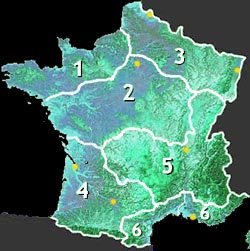
The regions of France
France is so much more than just Paris
Click
on the map above/right or on area links below for information
on
a region or area and its top tourist attractions.
- Explore France ►
- KEY PAGES
- Where to go
- How to get there
- More about France
Site
search
About-France.com
What are you looking for ?
What are you looking for ?
About-France.com
- the connoisseur's guide to France
1. Discover the regions of France
The 13 regions of metropolitan France
For new regions formed by the merging of two or three old regions, links lead to the constituent areas, i.e. the former regions.- Auvergne - Rhône-Alpes
- Bretagne (Brittany)
- Bourgogne - Franche-Comté
- Corse (Corsica)
- Centre - Val de Loire
- Grand Est (Alsace, Champagne, Lorraine)
- Hauts de France ( Nord Pas-de-Calais - Picardie)
- Ile de France (Paris)
- Nouvelle Aquitaine (Aquitaine, Poitou-Charentes, Limousin)
- Normandie
- Occitanie (Midi-Pyrénées, Languedoc)
- Pays de la Loire
- Provence - Cote d'Azur
Areas of France that are not designated regions |
| The Dordogne area |
| The French Riviera |
| The Camargue |
| Gascony |
| The French Alps |
| The Massif Central |
| Cathar country |
| The coasts and seaside of France |
Since 2016, Metropolitan France has been divided administratively into 13 regions; until 2015, there were 22 regions.
The reduction has been obtained by merging certain regions together, as can be seen on the map above. Some of the new super-regions combine the names of the old regions, others like Occitanie or Grand Est are new. Meanwhile the names of the old regions of France that have been merged have not been completely abandoned, specially those that like Limousin, Champagne or Alsace, are historic provinces or areas of France, which have a historic identity.
There are also five overseas regions. Select any region or area in the list below right, or on the map above, for specific regional information and main tourist attractions.
Administrative regions of France
Regions are the top tier territorial units of France. There are 13 regions in metropolitan France, the term used to include continental France plus the island of Corsica. There are also five overseas regions. Merged regions are linked by colour in the map at the top of the page. For example Midi Pyrenees and Languedoc Roussillon are now combined in a new region called Occitanie.Following the 2016 regional reform, there are now nine regions in the north of France, and just three in the south of continental France. This guide only covers France in Europe, and excludes French overseas regions such as the Caribbean islands of Martinique and Guadeloupe. Each region has its regional council, whose members are elected by universal suffrage. The council is presided over by a regional president, and has a full local administration to go with it.
Regions have extensive powers in the fields of transport, infrastructure, economic development, tourism and education (provision of lycées), and since these powers were devolved to them from 1981 onwards regions have often worked hard over the years to develop a regional identity.
Regions are the top tier of a distinctly complex multi-tiered system of local administration, which also includes counties (départements), local areas (communautés de communes, or Intercommunalités) and boroughs (communes).
Historic regions, provinces and other areas :
Many of today's French regions correspond largely to the provinces of pre-revolutionary France, and share the same name. Others are modern creations including areas from different historic provinces.France also has a number of well-known "areas" which are not administrative regions. These are historic or geographic areas, or simply areas that have an identity in terms of tourism. See the list to the right.
►Going further :
- Discover the main heritage cities of France
- Discover the most rural parts of Rural France
- Discover wild France - far from the crowds
- Click for a larger regional map of France (physical).
Regional reform:
The regional structure of France changed in 2016 as part of a major overhaul of local government that been on the cards for many years.2. The six tourist areas of France
Select
a tourist area of France for a general overview:
|
 For
tourism
purposes, France can alternatively be considered as six tourist areas,
each with different characteristics. Each of the six areas
has its own particular appeal and characteristics as a tourist
destination, and each has plenty to discover, and plenty to offer. For
tourism
purposes, France can alternatively be considered as six tourist areas,
each with different characteristics. Each of the six areas
has its own particular appeal and characteristics as a tourist
destination, and each has plenty to discover, and plenty to offer. ◄ Select one of the six areas from the list on the left, for a general overview of this particular area of France. For more detailed information, choose the corresponding regions of France as listed above. |
About-France.com
Home
page - Site
search
- Regions
- Maps of France
- Contact
►
France
as six tourist areas
See part 2 below. France can be divided - as a tourist destination -
into six areas, combining similar neighbouring regions into larger and
coherent areas with similarities in terms of climate, environment and
tourist attractions.
About-France.com is an independent user-supported website, Links to carefully selected affiliate partner websites may generate commission on sales at no cost to the user.

 Shop safely
from France.
Shop safely
from France.
Gifts from France, fashion, souvenirs, food and wine and more.
Copyright notice: Website and text © About-France.com 2003 - 2026 except where otherwise indicated.
Devolved
regional powers in France :
Regional authorities in France are responsible for an increasingly large number of public services. Click for more details
Regional authorities in France are responsible for an increasingly large number of public services. Click for more details
Holiday
gites in France direct booking
with owners mostly
English speakers
Gitelink.com
Gitelink.com
About-France.com is an independent user-supported website, Links to carefully selected affiliate partner websites may generate commission on sales at no cost to the user.


Gifts from France, fashion, souvenirs, food and wine and more.
A choice of French
stores & brands that deliver abroad
Copyright notice: Website and text © About-France.com 2003 - 2026 except where otherwise indicated.
